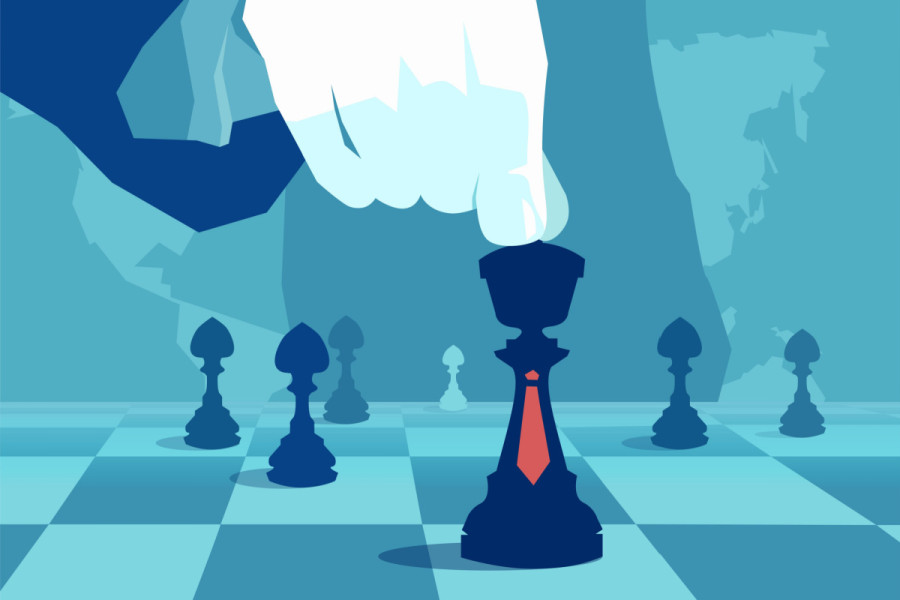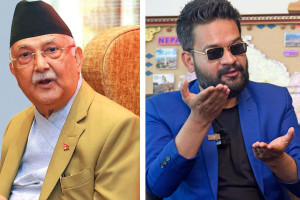Columns
The political games
One can only hope that wise heads prevail in the current coalition.
Deepak Thapa
Growing up, my father would throw little nuggets of information my way now and again. I do not remember exactly when but it could have been in 1975 as we walked around Tundikhel, marvelling at the lights strung up on trees in preparation for King Birendra’s coronation, that he told me about the powers the British queen had (or, rather, did not have). It was probably the excesses our poor country was having to bear for the sake of our absolute monarch that prompted my dad to tell me that were the British Parliament to pass a bill demanding her execution, the queen would have no choice but to sign it. Although Charles’ accession to the British throne as only the third of the Charleses reminds some of how the first one had his head chopped off, that particular example of the queen may have been hyperbolic even though it was rooted in a long-standing tradition.
Following that same tradition, we have been opting for the Westminster style of parliamentary government ever since rule by the people became imaginable after 1951. Unlike the steady hands-off approach of Elizabeth II in British politics, we have not been as lucky with the heads of state over the same period of time as her reign.
Hemmed and hawed
First came King Tribhuvan, who hemmed and hawed about handing power to the people, and then died. His son, Mahendra, continued with his father’s approach of playing cat-and-mouse with our hapless politicians. And when the time did come, he cut short our first experiment with representative democracy. Although he did not spell it out, he appeared to be a firm believer in the divine right of kings to rule that proved the fatal undoing of Charles I. Third in this succession, Birendra was forced to cede to the people after 18 long years of a lustreless rule, and thereafter lurked in the background without fully fading away. His activist brother Gyanendra sped the transition to a republican Nepal, and we entered the era of presidents.
Although an accidental choice, our first president, Ram Baran Yadav, grew into the role and was able to provide a level of gravitas demanded of him at a time of such turmoil in the country. Even his preferred choice of informal attire, a gamchha slung over his kurta and topped by a Dhaka topi, spoke volumes about how he viewed the office of the president. The one hiccup in his tenure was his pushback against the dismissal of the army chief by the prime minister, based on a technicality. The image that he will likely be most remembered for was while promulgating the 2015 constitution, he touched the document with his forehead in a show of reverence it demanded. He did not dither in his duty although as a son of the Tarai, it must have pained him that people there were being killed for their opposition to it.
Yadav was followed by Bidya Devi Bhandari, someone whose resume as a middling political activist was long, but whose main claim to fame was being the widow of the charismatic Madan Bhandari not to mention being a close ally of the new prime minister, KP Sharma Oli, the main purveyor of a constitution that had set the Tarai on fire. Despite her lack of other qualifications, her historic ascension to the presidency was undeniable. If we had expected Bhandari to rise to the presidency, it seemed possible for the first couple of years. She fulfilled the role of the president in the usual ways that a ceremonial head of state does.
Until, that is, her supposedly former party, the CPN-UML, came to power with a supermajority in the 2017 elections. Sher Bahadur Deuba was the prime minister at the time and he got a foretaste of how things were going to run when he decided to nominate three members to the upper house of Parliament. Although certainly the prerogative of the government, as a caretaker only waiting for the majority party to take over, Deuba had absolutely no moral authority to make those appointments (just as he had none to choose the heads of the seven provinces either). Bhandari just sat on the nominations until they were withdrawn by the Oli government that took office a week later. The president would have been well within her rights to remind the prime minister that by parliamentary tradition he should have deferred those decisions to the incoming government. Instead, we were treated to a silent petulance unbecoming of the office she held.
More of that was to follow around the fiasco related to what can only be described as Oli’s serial attempts at a power grab in 2020-21. From instant endorsement of any decision by Oli placed before her to the national embarrassment of her tittering when Oli cut her off as he took office for the third time, Bhandari turned the presidency into little more than an appendage of the UML. That included the unseemly attempts to broker peace between its squabbling factions before they went their separate ways.
Then came the Citizenship Bill and her toeing the UML line all the way to the hilt. What was dangerous was her bringing in top former army and police officials for "consultations" on the bill, knowing fully that like elsewhere in the world, the top ranks of these services are packed with conservative voices. Bhandari and her advisers can crow however long they want that as head of state, it is her duty to protect the constitution. What they conveniently forget is that she is a president in name only, and any credit or blame for any action of hers devolves on the government of the day. As long as it is not explicitly stated so, it is not her place to decide what is constitutional or not. There is a constitutional bench in the Supreme Court for the express purpose of deciding disputes of that kind.
Polarised times
These polarised times will ensure that debates on Bhandari’s action will be overshadowed by discussions on the merits and demerits of the Citizenship Bill. That will be most unfortunate since at stake is not whether a few hundred thousand get the citizenship papers or not. The body blow the president has landed through her adventurism will further weaken our budding federal democracy that Oli tried so hard to emaciate during his time in power.
If, as is rumoured, Bhandari is looking for another innings in politics as the head of the UML, she should realise fully well that, if upheld by the courts, the precedent she has established will come to haunt her should she ever come to power. We did not need the crisis the president has provoked since we are already at a precarious moment with the suspended chief justice of the Supreme Court under what looks like house arrest. One can only hope that wise heads prevail in the current coalition, and that in its attempt to retaliate it does not bring down the entire political edifice altogether. The blame game will become pointless then.




 10.12°C Kathmandu
10.12°C Kathmandu















